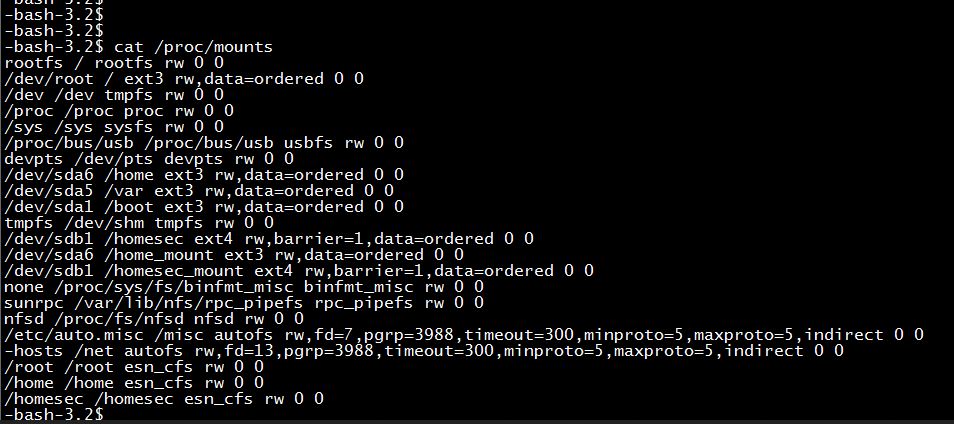1、介绍/proc/mounts
如何利用/proc/mounts知道已经挂载上的设备呢,我们先来看看/proc/mounts都有啥东西

解释一下,第一列是设备路径,比如说/dev/sda1,第二列是挂载点(即设备挂载到的目录),第三列是以什么文件系统挂载。
2、编代码读取前3列
#include <stdio.h>
#include <stdlib.h>
#include <string.h>
int read_proc_mounts()
{
FILE *fp = NULL;
int i = 0;
int nSscanfNum = 0;
char chDevicePath[255] = {0};
char chMountPath[255] = {0};
char chFsTypeName[255]= {0};
char chBuffer[1024] = {0};
fp = fopen("/proc/mounts","r");
if (NULL == fp)
{
printf("\n read /proc/mounts error! \n");
return -1;
}
while(1)
{
memset(chBuffer,0,sizeof(chBuffer));
if(NULL == fgets(chBuffer,sizeof(chBuffer),fp))
{
break;
}
memset(chDevicePath,0,sizeof(chDevicePath));
memset(chMountPath,0,sizeof(chMountPath));
memset(chFsTypeName,0,sizeof(chFsTypeName));
nSscanfNum = sscanf(chBuffer ,"%[^' '] %[^' '] %[^' ']",chDevicePath,chMountPath,chFsTypeName );
if(3 != nSscanfNum)
{
continue;
}
printf("\nchDevicePath[%s],chMountPath[%s],chFstypeName[%s]\n",chDevicePath,chMountPath,chFsTypeName);
}
fclose(fp);
return 0;
}
int main()
{
read_proc_mounts();
return 0;
}
3、运行结果
-bash-3.2$
-bash-3.2$ gcc test_proc_mounts.c
-bash-3.2$
-bash-3.2$
-bash-3.2$ ./a.out
chDevicePath[rootfs],chMountPath[/],chFstypeName[rootfs]
chDevicePath[/dev/root],chMountPath[/],chFstypeName[ext3]
chDevicePath[/dev],chMountPath[/dev],chFstypeName[tmpfs]
chDevicePath[/proc],chMountPath[/proc],chFstypeName[proc]
chDevicePath[/sys],chMountPath[/sys],chFstypeName[sysfs]
chDevicePath[/proc/bus/usb],chMountPath[/proc/bus/usb],chFstypeName[usbfs]
chDevicePath[devpts],chMountPath[/dev/pts],chFstypeName[devpts]
chDevicePath[/dev/sda6],chMountPath[/home],chFstypeName[ext3]
chDevicePath[/dev/sda5],chMountPath[/var],chFstypeName[ext3]
chDevicePath[/dev/sda1],chMountPath[/boot],chFstypeName[ext3]
chDevicePath[tmpfs],chMountPath[/dev/shm],chFstypeName[tmpfs]
chDevicePath[/dev/sdb1],chMountPath[/homesec],chFstypeName[ext4]
chDevicePath[/dev/sda6],chMountPath[/home_mount],chFstypeName[ext3]
chDevicePath[/dev/sdb1],chMountPath[/homesec_mount],chFstypeName[ext4]
chDevicePath[none],chMountPath[/proc/sys/fs/binfmt_misc],chFstypeName[binfmt_misc]
chDevicePath[sunrpc],chMountPath[/var/lib/nfs/rpc_pipefs],chFstypeName[rpc_pipefs]
chDevicePath[nfsd],chMountPath[/proc/fs/nfsd],chFstypeName[nfsd]
chDevicePath[/etc/auto.misc],chMountPath[/misc],chFstypeName[autofs]
chDevicePath[-hosts],chMountPath[/net],chFstypeName[autofs]
chDevicePath[/root],chMountPath[/root],chFstypeName[esn_cfs]
chDevicePath[/home],chMountPath[/home],chFstypeName[esn_cfs]
chDevicePath[/homesec],chMountPath[/homesec],chFstypeName[esn_cfs]
-bash-3.2$

